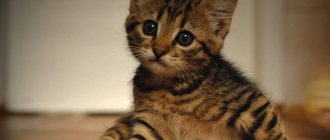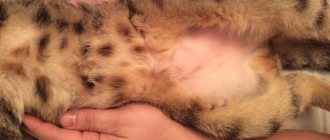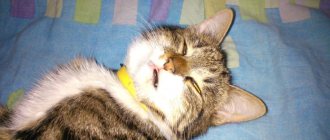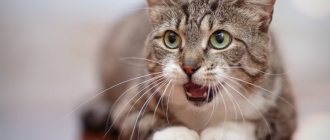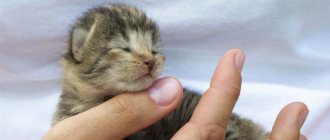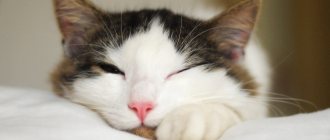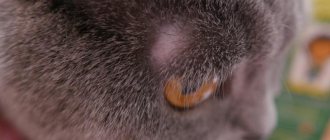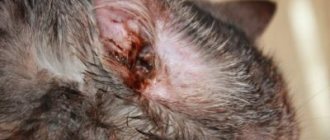11263Administration
1
Cats have a slightly different perception of smells than humans. Cats can actually enjoy some scents that are unacceptable to humans. If you notice that your cat constantly licks your armpits, enjoys playing with dirty socks, or sleeps on your clothes, do not be afraid of such an unusual pet addiction. This behavior of a furry pet does not indicate health problems or a violation of the psycho-emotional background in representatives of the feline family.
Why are cats attracted to specific smells?
Attentive owners of furry pets may have noticed that cats show special interest in smells that are unusual, in human opinion. For example, cats love the smell of dirty clothes, unwashed socks or sweaty armpits. Thus, some kittens and adult pets like to sleep on unwashed linen, put their muzzles in shoes or enjoy “poking” into the armpits, while preferring more male ones. What causes this behavior, why do cats lick their armpits?
© shutterstock
First of all, don’t be scared and think that your pet has gone crazy. The thing is that representatives of the cat family have a much better developed sense of smell than humans. Cats can detect odors and aromas that are not sensitive to our noses and at the same time feel them much more strongly.
Through new scents, cats navigate in space and adapt to environmental conditions.
Smells can attract or, conversely, repel cats. For example, cats simply adore human sweat. Animals like the smell of their owner's clothes and shoes. It is worth noting that such “scents” attract more adult cats than kittens. Babies show less interest in strong aromas and use their owner's clothes or socks as new toys.
Symptoms of diseases
There are cases when licking people is a desire to draw attention to the pet’s health problems, and not a show of love or a request for affection. These may be diseases or conditions such as:
- Skin parasites, including fleas. The cat worries not only about itself, but also about the people around it, and is trying to get rid of the problem.
- Allergy. If feeding is incorrect or the food is changed, skin problems can occur, which leads to excessive licking of yourself and those around you.
- Disturbances in general health. By licking frequently, the animal tries to signal that something is wrong with it. It is important to notice changes in behavior and contact a veterinarian promptly.
- Infectious diseases. Some of them cause itching and rashes on the skin, which irritates the pet and he tries to get rid of it in this way.
Why are cats attracted to human sweat?
One of the strange manifestations of a cat’s affection for its owner is the cats’ love for unpleasant, specific odors. Some owners note that their pets are addicted to the smell of sweat. Don't be surprised if cats lick your armpits, lick your hands, face, head. Concentrated odors of humans, in particular the owner, and family members have a calming effect on cats.
Cats love to lick their armpits for the following reasons:
- Sweat contains hormones similar to pheromones, which cats use to attract members of the opposite sex.
- The strong, pungent smell of sweat has a calming effect on cats.
- The cat needs enough salt, and as you know, sweat contains a large amount of sodium salts and other minerals.
- Adult animals react to sweat in the same way as to catnip, mint, and valerian. Catnip contains a special pheromone that mimics the pheromones of cats ready to mate. Mint and valerian have a relaxing effect.
- If a cat walks on the street and, returning home, begins to rub against clothes and shoes, it interrupts third-party aromas with “family” ones, that is, the owner’s.
© shutterstock
Male pheromones attract cats during the period of sexual hunting (estrus) and vice versa.
Some cats perceive human sweat with a secretion secreted by glands located on the animals' cheeks. Therefore, if a cat rubs against its owner, it leaves its scent there, noting that it is part of a pride.
According to another theory, if a cat constantly licks his hands, face, and shows interest in clothes, thus he shows his affection, the highest degree of trust.
As you can see, there is nothing wrong with the fact that cats are attracted to human-specific aromas. If the cat receives a balanced diet and is not subject to frequent stress, do not be alarmed by the fact that the pet shows interest in your clothes or licks your armpits, head, or hands.
IMPORTANT! VETERINARIAN CONSULTATION REQUIRED. INFORMATION FOR INFORMATION ONLY. Share with friends Article rating (1 ratings, average: 4.00 out of 5)
Why might adult cats like the smell of sweat?
Secondly, as you know, cats really like the salty taste - so licking a sweaty person or chewing on his sweat-soaked things can be tasty for them.
Thirdly, things from the street or, for example, from the gym may carry foreign odors, which the cat tries to get rid of, marking them with its own smell, which are imperceptible to humans.
There is another version. Cats, being predators, instinctively seek to get rid of their own scent by acquiring the scent of another creature. Supposedly this is the key to a successful hunt. And strong-smelling household items seem quite suitable for this purpose.
Why do cats lick their armpits?
Surely many cat breeders have noted some interesting preferences in their pets. For example, some cats love to lick human armpits. And the more concentrated the smell emanates from the armpit, the more the animal strives to get there with its muzzle. What is it that attracts representatives of the cat family so much in human sweat that they are even ready to lick it with their tongue?
As it turns out, some odors that are unpleasant to humans have a beneficial effect on animals. And the greater the concentration, the better for the cat.
The composition of human sweat includes substances similar in composition to the substances of the famous catnip plant. It is on catnip that our beloved purrs prefer to wipe themselves during the mating season in order to leave an unforgettable aroma on themselves.
Another reason why cats love to lick their armpits is their taste for salty foods. As you know, human sweat has a high salt content, which is what attracts cats.
By the way, in addition to their armpits, some pets enjoy licking earwax, sucking dirty socks, or rolling out in unwashed underwear. It is absolutely not the cat’s fault that she is driven by natural instincts, and in order to somehow calm them down, the animal resorts to such non-standard methods.
Surely many cat breeders have noted some interesting preferences in their pets. For example, some cats love to lick human armpits. And the more concentrated the smell emanates from the armpit, the more the animal strives to get there with its muzzle.
What is it that attracts representatives of the cat family so much in human sweat that they are even ready to lick it with their tongue?
As it turns out, some odors that are unpleasant to humans have a beneficial effect on animals. And the greater the concentration, the better for the cat.
By the way, in addition to their armpits, some pets enjoy licking earwax, sucking dirty socks, or rolling out in unwashed underwear. It is absolutely not the cat’s fault that she is driven by natural instincts, and in order to somehow calm them down, the animal resorts to such non-standard methods.
Some cat owners are surprised to note their pets' interest in all kinds of smells that are specific from a human point of view, such as the aromas of stale socks and sweaty armpits. Why do cats love the smell of sweat, can this be changed? Let's take a closer look.
Many owners are surprised to note the special predilection and undying interest of their pets for the smell of sweat. Cats poke their faces into the armpits (more often than men), bury themselves in dirty clothes, like to stick their head in a shoe or boot, and also play with stale socks.
The owners are surprised by this behavior and worry about the health of their pets. But don’t, your pets are fine, it’s just their natural interest in exploring new smells brought from the street, and the smell of the owner’s sweat generally has a calming effect on them, like valerian or catnip.
It has been noted that 20–30% of cats do not react in any way to mint and valerian.
Such representatives of this family will most likely be indifferent to sweat. But the smell of the owners’ clothes still attracts them and calms them down.
This is because the cat’s olfactory organ is very well developed; it can capture and distinguish much more aromas than the human nose. Therefore, some of them may influence their behavior. Just as adult animals react more passionately to sweat and dirty clothes, these smells do not make such an impression on kittens; for them, the main thing is to play and explore new aromas, of which there are a limitless variety for them.
And although such cat passions in the form of chewing, sucking and rubbing on shoes, socks, shirts and armpits may look very strange to the owners, this is a completely normal and common phenomenon. Some cats only love the smell of their owners, while others are attracted to any person who comes to visit with a pungent odor, which may not be so sensitive to the human sense of smell. And pets most often enjoy such scents.
The thing is that these plants contain a component called nepetalactone, which is what is attractive to cats, imitating their sex hormones. This theory is confirmed by the fact that kittens do not react in any way to these herbs, and males are much more susceptible to it than females.
Catnip belongs to the Lamiaceae family, which also includes some mint plants. Although these plants contain toxic substances, they do not have harmful effects.
Another attractant, valerian, produces a stimulating effect on cats, thanks to the substance it contains called actinidin; it causes the same reaction in felines as nepetalactone. Animals under the influence of these substances may become agitated and, in some cases, slightly aggressive.
And although growing valerian is not harmful to cats, medications containing high levels of it can be dangerous. Chlorine can have a similar effect, but unlike plants, it is very toxic.
We humans live by reason. We have pushed all our primitive instincts very far, in return we have gained the ability to think abstractly. And they developed remarkable (well, compared to animals) intelligence. But everything in animals can be explained by instincts, innate and conditioned reflexes.
Domestic cats are no exception, even if you have ennobled your cat as much as possible and done grooming, he still remains an animal with his own reflexes; by the way, beautiful grooming of British cats can be done in a special beauty salon for cats and dogs.
It is there that your furry pet will be transformed and its natural beauty will shine with new colors!
And when the next owner says that yesterday the big red cat Barsik was offended by him, it only makes me smile. Animals do not know how to be offended, sad or surprised. Even the strangest behavior can be explained from the animal's point of view.
A guy at my house fell asleep lying on his back with his hand under his head.
This way the armpit turned out to be open. And the cat jumped up and began to lick her and then bite him, which is why he woke up immediately.
And then this situation repeated itself other times.
Why might a cat like other people's armpits?
Perhaps the cat mistook your armpit for an armpit and tried to eat your boyfriend.
But seriously speaking, there is an assumption that cats like to lick and bite people’s armpits because sweat is actively secreted in these places. Which, perhaps with its smell, and perhaps with some other substances contained in sweat, such as salt, attracts cats. For humans, a slight smell of sweat may not be too noticeable, but for cats, with their more sensitive sense of smell, this smell can be quite attractive.
Attentive owners of furry pets may have noticed that cats show special interest in smells that are unusual, in human opinion. For example, cats love the smell of dirty clothes, unwashed socks or sweaty armpits. Thus, some kittens and adult pets like to sleep on unwashed linen, put their muzzles in shoes or enjoy “poking” into the armpits, while preferring more male ones. What causes this behavior, why do cats lick their armpits?
First of all, don’t be scared and think that your pet has gone crazy. The thing is that representatives of the cat family have a much better developed sense of smell than humans. Cats can detect odors and aromas that are not sensitive to our noses and at the same time feel them much more strongly.
Through new scents, cats navigate in space and adapt to environmental conditions.
Smells can attract or, conversely, repel cats. For example, cats simply adore human sweat. Animals like the smell of their owner's clothes and shoes. It is worth noting that such “scents” attract more adult cats than kittens. Babies show less interest in strong aromas and use their owner's clothes or socks as new toys.
One of the strange manifestations of a cat’s affection for its owner is the cats’ love for unpleasant, specific odors. Some owners note that their pets are addicted to the smell of sweat. Don't be surprised if cats lick your armpits, lick your hands, face, head. Concentrated odors of humans, in particular the owner, and family members have a calming effect on cats.
Cats love to lick their armpits for the following reasons:
- Sweat contains hormones similar to pheromones, which cats use to attract members of the opposite sex.
- The strong, pungent smell of sweat has a calming effect on cats.
- The cat needs enough salt, and as you know, sweat contains a large amount of sodium salts and other minerals.
- Adult animals react to sweat in the same way as to catnip, mint, and valerian. Catnip contains a special pheromone that mimics the pheromones of cats ready to mate. Mint and valerian have a relaxing effect.
- If a cat walks on the street and, returning home, begins to rub against clothes and shoes, it interrupts third-party aromas with “family” ones, that is, the owner’s.
Male pheromones attract cats during the period of sexual hunting (estrus) and vice versa.
According to another theory, if a cat constantly licks his hands, face, and shows interest in clothes, thus he shows his affection, the highest degree of trust.
As you can see, there is nothing wrong with the fact that cats are attracted to human-specific aromas. If the cat receives a balanced diet and is not subject to frequent stress, do not be alarmed by the fact that the pet shows interest in your clothes or licks your armpits, head, or hands.
In the Pets section, to the question Why do cats like to lick armpits? =) asked by the author Vadim Fedoseev, the best answer is this. All previous cats licked armpits (salt), heads after physical activity, and the last one prefers to suck on my neck and throat (clean). I don’t know how to explain this. Maybe energy?
And mine does the same)
They love the smell of sweat
They don't have enough salt. This is most often done by those who eat natural food rather than dry food.
and they are also bothered by their unswept and sweaty heels. You’ll come back after work and she’ll soak all your armpits and heels. Maybe they like the taste of sweat?
And mine licks everything))) If you stroke her belly, and if I’m lying under a blanket, she licks it, if I’m just holding her in my arms, then she licks everything she can reach) ) But the main thing for her is to stroke her belly)))
The owner cannot do this to himself. The cat understands this.
and ours is licking everyone’s heads)))))) the husband is cheering, exposing his skating rink to him)))))
As soon as the cat appears, I will definitely train her to do this..)
Raising cats - how to wean cats from “bad” habits?
With their legendary curiosity, cats can cause a lot of trouble. But tailed pets are difficult to train; you need a lot of patience. For those who do not want to bother themselves with such difficulties, you can take into account the dislike of cats for certain smells. This will help scare away the mustachioed striped ones from those areas where they do not belong. What smell do cats not like?
- Cats hate citrus scents. If you crumble the skins of oranges or lemons into a flower pot that your cat has gotten into the habit of nibbling, she will no longer come near it.
- You can spray the area where you don't want a cat's presence with vinegar. Cats hate him. For humans, the vinegar smell will become invisible after a few minutes, but cats will smell it for much longer.
- Lavender, mint, and rue can also act as natural scarecrows. They can be planted in a garden area where the presence of cats is undesirable.
- You can buy cat repellent spray at pet stores. The method of using it is simple: where the cat has become accustomed to shitting, you need to spray it with a spray. Cats avoid such places; they don’t like them.
- Cats are also repelled by essential oils made from lemongrass or orange. You can prepare a mixture based on rosemary, cinnamon and lemongrass by adding three parts of water.
The mixture should be sprayed daily until the cat realizes that these places should not be approached. After a long time, the pet may forget unpleasant associations and return to forbidden places. Therefore, the owner will have to repeat spraying from time to time. You can also not spray the solution, but make cotton balls, dip them in the product and scatter them where needed.
Main reasons
Cats are one of the most independent and self-sufficient pets you can keep at home. Some people periodically feel like they are the ones living with their animal, and not the other way around, they behave so proudly. Therefore, when pets start licking their hands, many people want to think that this is only because of strong love and affection. However, this is not entirely true; there are also other reasons for this.
This behavior is one of the main reasons for licking the head, hands, face, and hair of its owner. A cat avoids people who, for one reason or another, are unpleasant to them. This could be a smell, a neglectful or rude attitude towards an animal, and many others. Therefore, if a pet shows sympathy in this way, there is no need to scold or drive him away.
After birth, when kittens are still blind and deaf, they communicate with their mother through tactile interactions. Cats lick their offspring many times a day. This moment remains in the memory of animals for life. When they reach puberty, but do not have kittens for one reason or another, they thus demonstrate maternal instinct.
Cats begin to lick their owner, thereby replacing the care of kittens. This seems funny and cute, but this behavior should alert the owner; it can harm the health of the pet. In this connection, veterinarians recommend sterilizing animals at the age of less than 12 months, if matings are not planned in the future.
Lack of attention
When the owner does not give his pet enough attention, this is fraught with damage to furniture, torn wallpaper and loss of mutual understanding with each other. Particularly active individuals can even bite a person. There are several signs that your cat wants affection or play that should not be ignored:
- flattens ears;
- nuzzles hand;
- licks the owner's nose and face.
The pet can lie flat on the floor at the owner’s feet and turn one side or another, as if showing an area of the body where it needs to be stroked or scratched.
Many cats enjoy having their foreheads and ears scratched. Moreover, the fur on the forehead should be stroked against growth, and the ears can be pulled a little. Some pets love it if their belly is touched, others cannot stand it. During molting, animals love to be combed, which is also worth taking into account.
You can start stroking without waiting for a call from your pet, but take the initiative yourself. To do this, you need to bring your hand to a distance of about 10 cm from the animal and scratch it nearby; if it reaches out and begins to rub against the owner, then the call for affection has been accepted.
Cat dominance
When licking, sometimes a cat shows its dominant role in the family. In this way she means that this person is her property. At the same time, the pet leaves its scent on the owner. If there are no signs of aggression, there is no need to fight this, as this is normal, because it is not for nothing that everyone knows that a cat is one of the most independent pets.
Anxiety and stress
With increased anxiety and stress, a cat often begins to lick itself and its owner. If such behavior has not been noticed before, or if it was much less so, you need to show the animal to a veterinarian, because this is a symptom indicating the presence of some pathology.
Another reason for this behavior is the animal’s low self-esteem. Licking the owner is a way to win him over and keep him safe. At the same time, the pet is tense and will constantly expect a trick, rather than enjoy communicating with the owner.
Boredom
Some animals, often and for a long time being alone, try to have fun on their own. Some start eating a lot, while others start licking. This is a way to cope with boredom. First, they constantly carry out the washing procedure, and then switch to the owner’s things, as well as hair, hands, face, and the person himself.
Cats have a very highly developed sense of smell, so they can lick the hands, feet, and armpits of their owners who come in the evening after work. The fact is that the smell of sweat formed on the human body during the day is a bait for animals. And by licking it, pets try to protect their owner from persecution by other animals and encroachment on their territory.
How to break your pet's habit
When an owner is annoyed by such excessive attention from his cat, there are several ways to try to get rid of this habit:
- A game. By switching attention to entertainment and giving your pet an outlet for energy, you can relieve her for a while from the desire to lick something or someone.
- Weasel. If the problem is stress or lack of attention, you need to pet and hug the animal more often, and the problem will disappear soon.
- Change of interests. Apply a special solution – catnip – to your pet’s toys. It is sold in pet stores. Its scent will attract the cat's attention.
- Refusal. If your pet's behavior becomes overly intrusive, every time he tries to lick him, you need to gently but decisively push him away and make it clear that this is not worth doing. After some time, the method will work and the cat will stop trying.
- Substitution for another item. Buy a fur mitten and put it on your hand every time you try to lick your fingers. After time, attention will switch to the object, and the owner will no longer be needed.
It is worth remembering that such behavior of a pet can be due to a whole range of different reasons and there is no need to get angry or scold him for it. After all, with such behavior the cat does not want to cause harm, but is simply trying to attract the owner’s attention to his person or show love.
Why do cats lick their armpits?
How to rid a cat of the obsessive desire to lick its owner
If hand licking is not associated with pathology, but is caused by the cat’s excessive love for humans, then experts advise doing the following:
- Buy toys for your animal that will attract his attention. These can be either mechanical devices or simple ones, like a fur mouse or a plastic ball with a bell inside.
- Buy catnip at the pharmacy. It is considered a good way to calm an adult cat that is under stress.
- Temporarily do not pick up the animal, but do not drive it away or beat it. When the cat jumps onto the owner’s lap, you need to move him, get up and leave. Gradually, the cat will lose interest in the owner and find a new activity.
- If a cat is undergoing rehabilitation after some illness, but still licks a person’s hands, you should massage his neck or the area along his back. This will relieve tension, calm him down and eliminate the need to lick his lips.
Cats don't just lick themselves to remove dirt. So they massage the glands that secrete a water-repellent oily liquid, and then spread it over the hair with their tongue.


